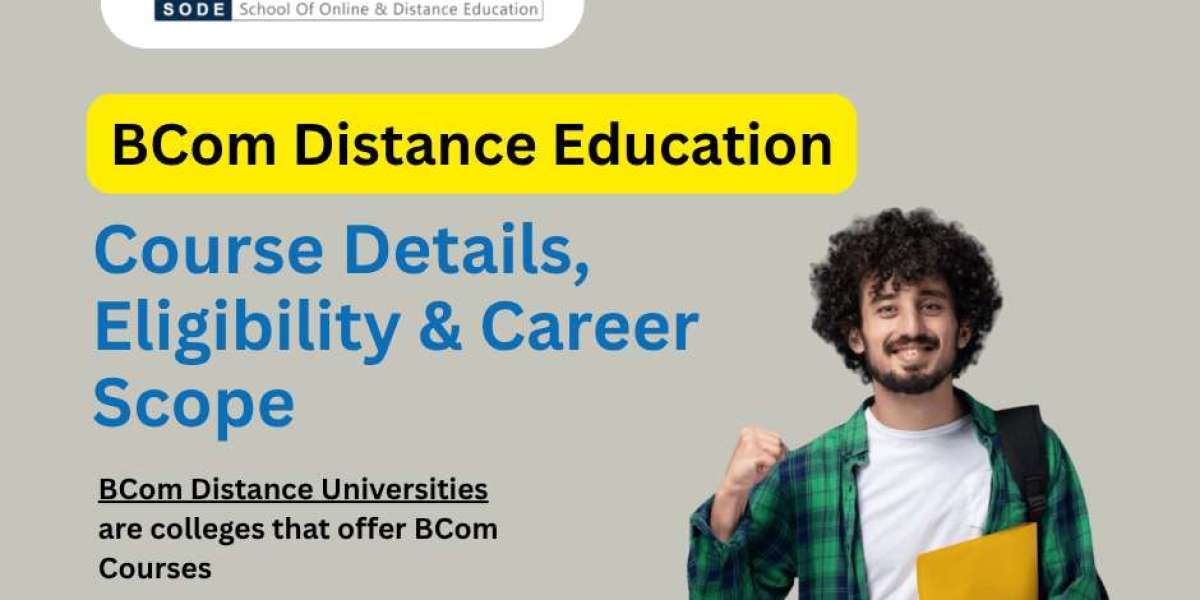Commerce has always been one of the most reliable and practical fields of study in India. With businesses expanding and the demand for professionals in accounting, finance, and taxation growing, a Bachelor of Commerce (BCom) degree holds immense value. However, not every student can attend regular college due to work commitments, financial limitations, or distance from urban education hubs. This is where BCom Distance Education comes in.
Distance education in BCom allows students to study from anywhere at their own pace, with the flexibility to balance jobs, family, or other responsibilities. The best part is that these degrees are recognized by the University Grants Commission (UGC-DEB), which means they hold equal validity for jobs and higher studies as regular degrees.
Whether you are a fresh 12th-pass student, a working professional, or someone who had to pause education earlier, BCom Distance Education allows you to continue your academic journey.
Eligibility for BCom Distance Education
The eligibility criteria for admission are intentionally kept simple so that a maximum number of students can benefit:
- Educational Qualification: Students must have passed Class 12 (10+2) from a recognized board.
- Stream Flexibility: While students from the commerce stream find it easier due to familiarity with subjects like accounting and economics, candidates from science or arts are equally eligible.
- Minimum Marks: Most universities require 40–50% in Class 12, though some open universities like IGNOU do not have strict cutoffs.
- Age Limit: There is no maximum age limit, so even those who discontinued studies years ago can apply.
Admission Process for BCom Distance Education
Getting admission into BCom Distance Education is far easier compared to regular colleges, which often have high cutoffs and limited seats. The process is usually straightforward:
- Application Form—Students need to visit the official website of the university (such as IGNOU, DU SOL, LPU, or KSOU) and fill in the online application form.
- Document Submission—Required documents include Class 10 and 12 mark sheets, ID proof (like Aadhaar or passport), passport-size photographs, and, in some cases, caste or income certificates for fee concessions.
- Fee Payment – After document upload, the admission fee is paid online (via net banking, debit/credit card, or UPI). Some universities also allow offline fee submission through banks.
- Admission Confirmation – Once verified, the university issues an enrollment number, login credentials for online study materials, and sometimes courier printed materials.
For example:
- IGNOU has two admission cycles every year (January and July).
- DU SOL generally opens its UG admissions in June/July.
- Private universities like LPU may offer rolling admissions throughout the year.
This simple admission system makes distance education far more accessible compared to regular colleges, which often reject students due to seat limitations.
Fees for BCom Distance Education
One of the strongest reasons students choose distance education is the affordability. The fee structure is designed to ensure that higher education remains accessible to all income groups.
- Government/Open Universities (IGNOU, DU SOL, KSOU): Annual fees range between ₹6,000 and ₹10,000, making the total program cost ₹18,000–₹30,000.
- Private Universities (LPU, Amity Online, Chandigarh University): Annual fees range between ₹12,000 and ₹20,000, with total costs between ₹36,000 and ₹60,000.
Additional benefits include:
- No hostel, mess, or travel costs, since students learn from home.
- Flexible payment options in installments.
- Some universities offer scholarships or fee concessions for economically weaker students or defense personnel.
Example: IGNOU charges around ₹8,100 per year, while LPU charges about ₹12,500 per year but provides a modern Learning Management System (LMS) with live lectures and placement support.
Career Path After BCom Distance Education
Completing BCom via distance education does not limit career opportunities in any way. These degrees are valid and recognized for both private and government jobs, as well as higher studies.
1. Higher Education Options
- M.Com (Master of Commerce): Ideal for students who want to specialize in commerce fields like finance, taxation, or economics.
- MBA (Master of Business Administration): Best for those aiming for management and leadership roles in business.
- Professional Courses: A distance BCom graduate can prepare for CA (Chartered Accountant), CS (Company Secretary), or CMA (Cost and Management Accountant) while continuing studies.
2. Job Roles After BCom Distance Education
Graduates can explore various career roles depending on their interests:
- Accountant or Accounts Executive
- Tax Consultant or Auditor
- Banking Officer or Loan Officer
- Financial Analyst
- HR or Administrative roles in companies
- Insurance Advisor or Business Executive
3. Employment Sectors
- Banking & Financial Services – National and private banks, NBFCs.
- Corporate Firms—Accounting, auditing, and finance departments.
- Government Jobs – SSC, UPSC, Banking Exams, State PSCs.
- Entrepreneurship—running small businesses, startups, or freelancing in finance.
4. Salary Range
- Fresh graduates can expect ₹2.5–₹5 LPA.
- With additional certifications (like CA or MBA), packages can rise to ₹8–15 LPA or higher.
Distance BCom students often have an advantage because many pursue work experience alongside their studies, making them more job-ready after graduation.
Why Choose BCom Distance Education?
Here are some clear reasons why students prefer distance learning for commerce:
- Flexibility: Study at your own pace, anywhere in India or even abroad.
- Recognition: UGC-DEB approved, equally valid as a regular BCom.
- Affordability: Lower fees, no extra costs for travel/hostel.
- Work + Study: Earn work experience while pursuing your degree.
- Accessibility: Ideal for students in rural areas or those who cannot attend regular classes.
For example, many working professionals pursue BCom Distance Education from IGNOU or DU SOL to meet eligibility requirements for promotions or government jobs.
Conclusion
BCom Distance Education is not just an alternative to traditional college—it is a practical, flexible, and affordable way of continuing higher education. With simple eligibility requirements, an easy admission process, and low fees, it has become a lifeline for students who cannot pursue regular college.
The degree holds the same validity as regular BCom programs, ensuring that students can apply for government jobs, private sector roles, higher education, or professional certifications without any restrictions.



